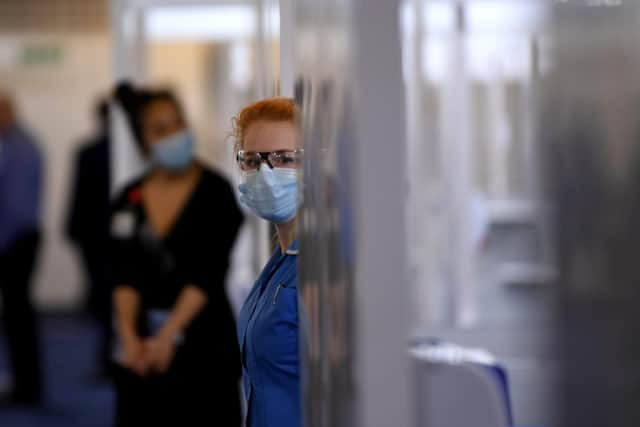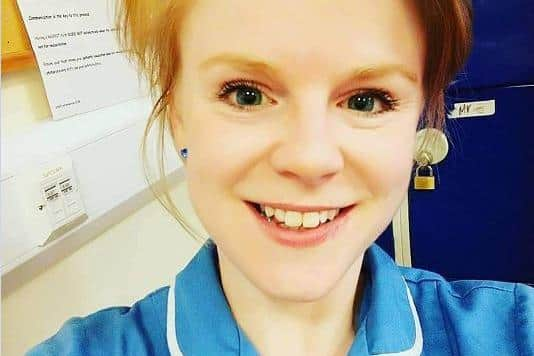Covid-19 two years on: Impact of pandemic on health workers laid bare
While standing in a busy intensive care unit surrounded by her colleagues tending to Covid-19 patients, it was a moment that was to define the traumas that Sinead Laverty had endured throughout the past nine months.
She felt the unmistakable swell of a panic attack take grip, leaving her unable to breathe properly and sobbing in the middle of the ward at St James Hospital in Leeds.
Advertisement
Hide AdAdvertisement
Hide AdTaken to a side room by one of her managers, Miss Laverty realised that the horrors of dealing with the Covid-19 pandemic had taken a toll that she had not fully comprehended.


The 38-year-old, who has been working as a critical care nurse in the NHS for the past nine years, said: “It was a moment when the dam simply broke, and my emotions flooded out.
“Dealing with the pandemic in the early months was so surreal - in many ways, it was like watching a movie, as nothing seemed real. I was on auto-pilot, and I only realised months later the impact that Covid-19 had had on my life.”
This weekend marks the second anniversary of the first two confirmed cases of Covid-19 in the UK after a Chinese student from the University of York was visited in the North Yorkshire city by his mother, who had travelled from the Wuhan province in China where the disease originated.


Advertisement
Hide AdAdvertisement
Hide AdThe impact of the pandemic has been without precedent in modern history, with a societal shift that is being felt two years on as coronavirus still remains an ever-present threat.
The profound impact of the disease has, however, perhaps been most keenly felt amongst the frontline workers in the NHS, who have faced the biggest challenges of their careers to cope with the impact of the virus.
Miss Laverty, who lives in Bramley in Leeds with her partner, Dan Platts, knows only too well the lasting effects that the pandemic has brought.
A month before her panic attack in January last year, she had been diagnosed with post-traumatic stress disorder (PTSD), the mental health condition which is triggered by experiencing a terrifying event and often associated with veterans of warzones.
Advertisement
Hide AdAdvertisement
Hide AdA study by researchers at King’s College London which was published last year found that nearly half of intensive care unit (ICU) and anaesthetic staff surveyed reported symptoms consistent with a probable diagnosis of PTSD, severe depression, anxiety or problem drinking.
The research aimed to build a picture of the rates of mental health disorders in ICU and anaesthetic staff in six English hospitals during June and July 2020.
It found that while just over half reported good well-being, many showed signs of mental health problems.
For Miss Laverty, her diagnosis was to lead to a dramatic shift in her life away from the work which she had been known and loved for almost a decade.
Advertisement
Hide AdAdvertisement
Hide AdShe said: “After the panic attack, I was signed off with stress - physically I was able to do the job, but mentally there was no way that I could carry on.
“My dad, Clem, had been diagnosed with Covid and my mum, Yvonne, had broken her foot at the time, and suddenly there was a realisation that health issues were impacting on the people that I loved.
“I did feel some real guilt, as I was leaving behind colleagues who were still having to deal with so many Covid patients.
“I had worked alongside colleagues whose faces I have never actually seen because they were wearing PPE (personal protective equipment) all the time after being seconded on to the intensive care wards, but what we shared meant we became so close.
Advertisement
Hide AdAdvertisement
Hide Ad“But I had to re-evaluate just what I was able to do, otherwise the reality was that I would have to leave my job and the NHS behind.”
The moment of clarity came while Miss Laverty was watching a news bulletin at the end of January last year which was detailing the latest update on the roll-out of the vaccine programme.
Miss Laverty spoke to her managers at the Leeds NHS Teaching Hospitals Trust, and was seconded to the vaccine centre that had been established at Leeds United’s ground, Elland Road.
With the help of weekly sessions with a psychologist, which were carried out via Zoom until only earlier this month when in-person appointments began, Miss Laverty is now preparing to return to the role she had begun in 2018 as a nurse on the high dependency unit at St James Hospital.
Advertisement
Hide AdAdvertisement
Hide AdShe said: “My managers and colleagues have been so supportive, as has Dan and my friends and family. I have realised that you need support networks both at work and in your personal life, and that has helped me through.
“Being able to talk about all that has happened has been a game-changer, and it is helping me through all of this.”
The past year has been dominated by the hope that the vaccine programme has given for the nation to claw its way out of the Covid-19 crisis.
A total of 138m doses have been administered in the UK, meaning 48.3m people - or 71.8 per cent of the population - are now fully vaccinated.
Advertisement
Hide AdAdvertisement
Hide AdAmong them is Amal Podder, a 69-year-old former maths lecturer who had to shield throughout 2020 as he was deemed clinically vulnerable due to a host of medical issues including diabetes and high blood pressure.
Mr Podder, who lives in Roundhay in Leeds with his 42-year-old wife, Lakshmi Chowdhury, and their two children, Anaya, 11, and Angshuman, said: “I cannot explain just how tough it was to have to literally cut myself off from the rest of society for all those months.
“If I had caught Covid, then that would have meant my life was in real danger, so I simply couldn’t take any risks.”
He was given his first dose of a vaccine on January 20 last year, but it was not until he had received his second jab in April that he felt confident enough to start re-engaging with society.
Advertisement
Hide AdAdvertisement
Hide AdMr Podder, who came to the UK from his native Bangladesh in 1979 to study in London, said: “Case rates were still high after my first vaccine, and my son does have heart and lung conditions, so I simply couldn’t take a risk.
“But I didn’t have any side-effects from the vaccine, and with the second dose I have felt more at ease to go out.
“It really has transformed my life, and I feel very lucky to have been given the opportunities through the vaccine - I cannot thank my GP, Amal Paul, and the NHS enough.”
The initial phases of the roll-out of the vaccine programme in West Yorkshire were overseen by Dr Phil Wood, the chief medical officer at Leeds Teaching Hospitals NHS Trust.
Advertisement
Hide AdAdvertisement
Hide AdSince the national programme began in December 2020, a total of 1,755,387 people have been vaccinated in West Yorkshire so far.
However, it is estimated that there are about 500,000 people in West Yorkshire who remain unvaccinated and about 300,000 people who have yet to have their booster jab.
Dr Wood said: “The vaccine programme has been a huge success and has brought some degree of normality to people’s lives, especially here in West Yorkshire where there has been a huge collaborative effort between all areas of the health service.
“But people still need to realise the importance of getting a vaccination, there has been something of a tailing off in numbers of the booster programme and several hundred thousand people in West Yorkshire still have yet to have their first jab.
Advertisement
Hide AdAdvertisement
Hide Ad“The past two years have been such a traumatic time, but through the vaccination programme there is real hope. Covid-19 is here to stay, unfortunately, and we need to learn to live with the disease.”
But for the families of the 155,000 people in the UK who have lost their lives due to Covid-19, the vaccine programme arrived too late to potentially save the lives of their loved ones.
Jayne Taylor-Broadbent admits herself that she has repeatedly wondered if her wife, Julie, could still be alive if she had been vaccinated.
Julie, a former social care worker, died aged 49 on May 8, 2020, four days after being admitted to Hull Royal Infirmary with a burst ulcer and then developing Covid-19 symptoms.
Advertisement
Hide AdAdvertisement
Hide AdMrs Taylor-Broadbent, 56, who is a product supervisor at a food production company in Hull, is a member of the Covid-19 Bereaved Families for Justice group, which is campaigning for a full inquiry into the Government’s handling of the pandemic.
She said: “There are so many unanswered questions about Covid-19, that I simply have not had the opportunity to grieve and try to come to terms with Julie’s death.
“Grief eludes you, and you are left in this horrible place where you aren’t able to move on. My lasting memories of Julie at the end are of her being in so much pain as she was struggling to breathe.
“The doctors and nurses who have been dealing with Covid-19 for the past two years have shown so much bravery while caring for patients like Julie. They deserve so much more recognition and a lot more reward for all that they have done, it is humbling to know that they are working in our National Health Service.
“I just hope that they have the strength to be able to carry on as this pandemic is far from over, and more people will lose their lives to this awful disease.”
Comment Guidelines
National World encourages reader discussion on our stories. User feedback, insights and back-and-forth exchanges add a rich layer of context to reporting. Please review our Community Guidelines before commenting.
